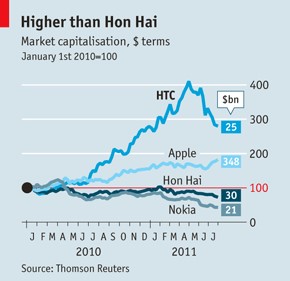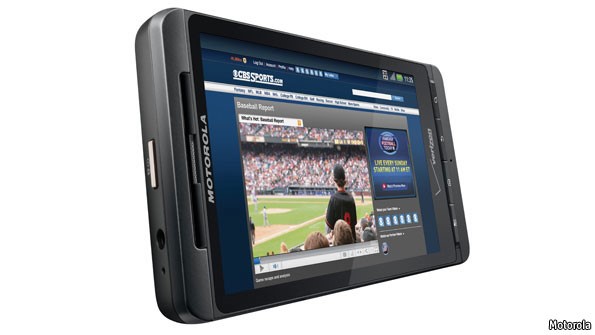

 字體:小 中 大
字體:小 中 大 |
|
|
|
| 2018/03/04 19:04:51瀏覽77|回應0|推薦0 | |
HTCs patent problemsAndroid alertUsing Google’s Android software has given HTC a boost, but it may now make the Taiwanese handset-maker vulnerable to costly lawsuitsJul 21st 2011 | TAOYUAN, TAIWAN| from the print edition
UNTIL a few years ago HTC was pretty small and relatively obscure. But the Taiwanese company’s recent growth has been remarkable. In the second quarter it sold 11m smartphones, more than doubling its revenues in the same period last year. HTC’s main rivals, Nokia, Samsung and Apple, still sell around twice as many smartphones. But its rapid growth, especially on Apple’s American home turf, has made it a competitor to reckon with. One reason for HTC’s surging sales is the relentless pace of its innovation: in the past quarter, in which Apple had no new iPhone to launch, HTC introduced ten new models. Another is Google’s Android operating system, on which most of HTC’s smartphones are now based, which has proved a hit among consumers. Apple has not taken the challenge from HTC lightly. On July 15th the US International Trade Commission upheld two claims in a larger patent suit Apple had filed against its rival. Earlier in the month, Apple had filed additional claims and MOSAID, a Canadian company, said it would also sue HTC, and Sony Ericsson, for patent infringement. The outcome of these cases will be of keen interest not just for HTC but for other handset-makers using Android: promoted as a free, open-source system, it is proving surprisingly expensive. This is because it relies on a host of basic features that may be subject to patents: how a screen is swiped with a finger, how a phone number embedded in an e-mail can be called by tapping it, and so on. Related topics Last year HTC resolved another claim over Android, with Microsoft, agreeing to pay it hefty royalties. More such suits may yet emerge, and prove costly. HTC’s shares, having hitherto outperformed its peers’, have dropped by a third since early June. HTC will appeal against the trade commission’s ruling; but it will fight back in other ways, too. This month it spent $300m buying a loss-making software firm, S3, which recently won a patent case against Apple and may have other patents that will be useful in fending off Apple’s legal forays. Founded in 1997, HTC started out mostly doing contract manufacturing for other gadget-sellers. But as it has gained confidence in making smartphones under its own brand, it has steadily risen up mobile operators’ lists of the handsets they promote to subscribers. By April this year it had a bigger market capitalisation than troubled Nokia. The firm’s success has pushed Cher Wang, its chairwoman and largest shareholder, to the top of Forbes’s Taiwan rich list, passing Terry Gou, the boss of Hon Hai. HTC has kept much of its production in Taiwan whereas Hon Hai (also known as Foxconn) has shifted it to mainland China and stuck with contract manufacturing—a business that emphasises cost-trimming and low value-added. HTC has shown remarkable speed in building new products, adapting to changing telecoms standards and developing its own applications software. And its manufacturing quality has been remarkably high. Unlike rivals HTC has not suffered unpleasant headlines about shoddy products or suicides at its factories. It has made progress in building a brand that reflects innovation and trust, allowing it to escape from the low-cost treadmill on which some of its peers remain stuck. But there is a risk that Android, a key element in this successful strategy, is turning into a vulnerability. Apple sees its patents as a weapon to undermine Android’s cost advantage. The more time HTC has to spend fighting lawsuits, and the greater the share of its revenues it has to pay out in software royalties, the harder it will be to keep up its remarkable run of success. from the print edition | Business === Android alert Jul 23rd 2011, 12:40
Gaekdzhqun, I don’t think “Patents do support innovation……”is right, and your every sentence is making strange connections of APPLE and HTC. Although HTC is only 15-year-old company, the importance of the world was emerging just from 2007 when Google signed the cooperative contract with HTC. And the start of HTC android phone’s sales was just two years ago when “Magic” and “Hero” were introduced to the market; meanwhile, HTC was expanding with android system updated to 1.6, having been competing with Sony, Samsung, Blackberry and Nokia for two years and expanding the sales with the trend in the iPhone.
As far as I am concerned, HTC is famous for her innovative conglomerate team, whose ability to put the latest product forward is as the same as Toshiba, and is known as one of the Top Taiwan’s Brand of the world, having the reputation for her value of this trademark. HTC’s growth is mainly accompanying Google’s expansion, including the good co-ordination of hardware and software. In contrast, iPhone’s process of software’s upgrade is not economical and always overthrow the predecessor’s design, and the iPhone’s apps is often similar to android’s apps too much.
I am one of the HTC’s Legend user in Taiwan for more than one year. The price and service is proper for me. I hardly forget the first sight of this android 2.2 system and this smooth touched glass and always remember how I surprise this one in Aurora’s branch near my address. I never and forever consider iPhone to be my cell-phone because its clumsy face is as funny as Steve Job’s. After I see this month’s Forbe’s Asia’s special column of the Top 40 richest, I will continue being one of users of HTC, and being one of the cell-phone’s radical believer. Just HTC and Cher Wang’s product accord with our demand (Sony is half-measure).
Recommended 16 Report Permalink 這是我第一篇半提及科技業,筆者在此前有兩年的時間習慣看PCWorld,這本沒有太喜歡Apple的產品但也不排斥,很多元化的介紹2010年轉折的科技業,很高興能搭上一班轉型中的科技資訊時代。裡面有提及台灣彼時的女首富王雪紅大姐,"famous for her innovative conglomerate team",被筆者拿來和很景仰的日本東芝集團比較,宏達電從這天約半年前剛超越了本來在世界評比台灣區第一的張明正先生的趨勢科技。包括筆者前年(2010)5月從震旦行新北新莊幸福門市購得第一台HTC Legend A6363 永遠記得該型號,筆者很喜歡清爽瀏覽器介面,頭幾週常常看Washingtonpost.com華盛頓時報的網頁和msnbc.com美國國家電視公司。另外就是音樂播放器簡潔俐落,不過影片無法播放,以及adobe flash不太支援是個小遺憾。這台對筆者來說印象很不錯,直到前年年底才開不了機(會自動關機),很耐用。當年五月筆者在士林當替代役男時曾經在紀伊國屋書店大葉高島屋分店瀏覽過Top 40,看過Forbes雜誌對台灣的產業及投資主評論說這領域應該會更上層樓,雖說今天HTC仍以U11+ 仍然居世界技術領導地位,或有台積電的patent仍居世界科技公司前兩名,台灣科技業普遍上尚待春天的到來。 這篇原文編輯故意指出,雖然HTC在半年內市值跌了一些,仍然在基本面有贏鴻海(以Market Capitalization增值比例來估)。不過隨著蘋果銷售手法推陳出新及安卓市場各路諸侯捉對廝殺,宏達電的業務萎縮,如今已把手機業務大部份經營權及供應鏈售出,只剩虛擬實境業務。之後幾年宏達電和Nokia、Samsung和Apple的patent的訴訟官司曠日費時,到了2013初才有較明確的裁決,此時宏達電已跌出全球智慧形手機銷售前十名外,這對他們來說是很大的損傷。 這篇口語化的英語太多,如half-measure,用so-so或superficially meet the overall standard.比較好 就是說當時行銷和主機版技術普普通通應付一下的一種表達。 (2018,08,05補充)附一個月後8月15日谷歌併購摩托羅拉,現在則是在中國聯想集團,作為其集團海外手機的品牌名程 Googles purchase of Motorola MobilityArming AndroidAug 15th 2011, 19:56 by L.S. | LONDON
SHOCK. Bombshell. Incredible. Even seasoned observers of the technology industry could not hide their surprise when it was announced on Monday, August 15th, that Google, the online giant, would buy Motorola Mobility, a maker of handsets and other electronic devices, for a whopping $12.5 billion. The deal not only comes as a surprise, it will have a big impact on the mobile industry, too. For starters, the merger is very good news for the shareholders of Motorola Mobility, among them Carl Icahn, the activist investor. The offer—$40 a share in cash—is 63% above the closing price of Motorola Mobility’s shares on Friday. It is unlikely that shareholders would have got such a price on the open market any time soon. Although Motorola Mobility, which was only spun-off from Motorola in January, has staged something of a turnaround, it is still too small to compete with much bigger rivals such as Apple, Nokia and Samsung. Since March its shares had been trading below their issue price of $25. As for Google, although it will spend about one-third of its cash on the biggest acquisition in its 13-year history, it will also get a lot: plenty of ammunition in the ongoing battle between mobile platforms. Android, Google’s operating system for smartphones and other mobile devices, has taken the world by storm. In America it now powers nearly 40% of new smartphones, outdoing the platforms of Apple and RIM, the maker of BlackBerry smartphones. Worldwide more than 150m Android devices have been activated, a number that is growing by more than half a million every day. Yet the Android “ecosystem”, as geeks call it, is also facing growing challenges. For one, the operating system has yet to make much headway in the market for computing tablets, mainly because Android devices are still not as user-friendly as Apple’s iPad. More importantly, although Google does not charge for Android, it is becoming increasingly costly for handset-makers—because rivals claim it infringes on intellectual property owned by other firms. In early 2010 HTC, one of the leading vendors of Android devices, agreed to pay royalties to Microsoft for the use of its patents ($5 per device, according to some estimates). And in July Apple won a legal victory against HTC in a patent infringement suit, which could lead to even higher payments. Taking over Motorola will help Google to overcome both of these problems. Owning a handset-maker allows the firm to integrate software and hardware more smoothly. It should not only be able to deliver more competitive Android tablets, but speed up the development of other sorts of consumer electronics (Motorola Mobility also sells television set-top boxes). In addition, Google will gain control of Motorola’s huge portfolio of intellectual property, which includes 17,000 patents worldwide. This will give Google—and, indirectly, makers of Android devices—a much better bargaining position in current and future legal battles, which include litigation brought by Oracle, a software firm, over Android’s use of Java, a software technology. Although Motorola Mobility’s shares soared close to the price offered by Google, suggesting that the market thinks that the takeover will succeed, it could still hit snags. Another suitor may emerge, possibly Oracle. Antitrust authorities on both sides of the Atlantic, which already have Google in their sights, will certainly take a close look, although it seems unlikely that they will block the merger. More fundamentally, the acquisition could discourage other handset-makers from using Android for their devices if they worry that Motorola will gain an unfair advantage. To allay such fears, Google has said that it will run Motorola as a separate business and that it will not change in any way how it manages Android. Even if the merger, as so many before it, turns out to be a costly mistake, it is another sign that the market for smartphones and other mobile devices will end up looking different from the personal-computer industry. Whereas with PCs operating systems were developed by one set of companies (mostly Microsoft) and the machines by another (Dell, HP, Acer), mobile devices seem to demand a deeper integration of software and hardware, delivered by a single firm. This has always been Apple’s approach. HP also has its own mobile operating system, WebOS. Google now seems to be going down this path, and others may follow suit. After the announcement of Google’s takeover of Motorola Mobility, analysts began speculating that Microsoft might nowbuy RIM or, more likely, Nokia, which has already agreed to use Microsoft’s Windows Phone as the software to power its next generation of smartphones. |
|
| ( 心情隨筆|心情日記 ) |











